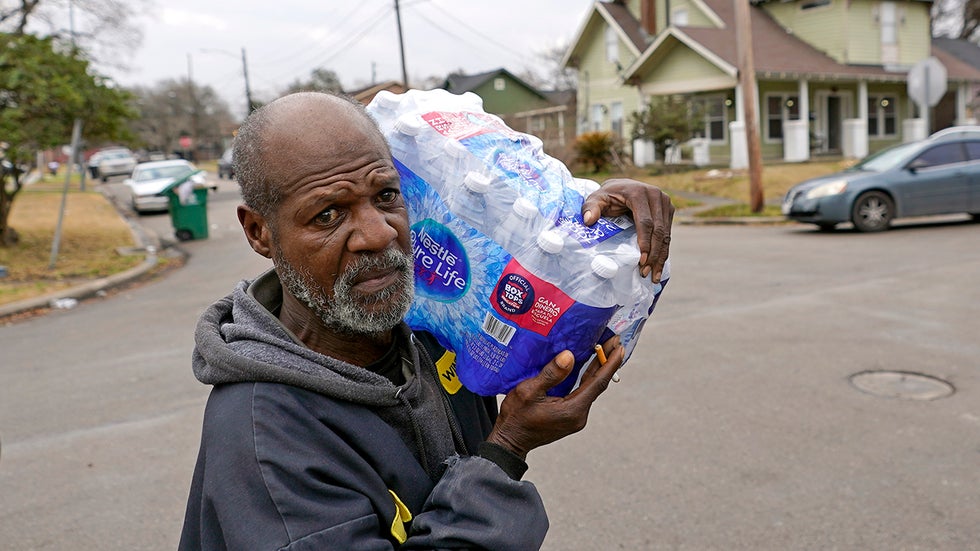Ron Brackett
 Mississippi Army National Guard Sgt. Chase Toussaint with the Maneuver Area Training Equipment Site of Camp Shelby, right, fills 5-gallon buckets with non-potable water, Monday, March 1, 2021, at a Jackson, Mississippi, water distribution site on the New Mt. Zion Missionary Baptist Church parking lot. Water for flushing toilets was being distributed at seven sites in Mississippi's capital city — more than 10 days after winter storms wreaked havoc on the city's water system because the system is still struggling to maintain consistent water pressure, authorities said.
Mississippi Army National Guard Sgt. Chase Toussaint with the Maneuver Area Training Equipment Site of Camp Shelby, right, fills 5-gallon buckets with non-potable water, Monday, March 1, 2021, at a Jackson, Mississippi, water distribution site on the New Mt. Zion Missionary Baptist Church parking lot. Water for flushing toilets was being distributed at seven sites in Mississippi's capital city — more than 10 days after winter storms wreaked havoc on the city's water system because the system is still struggling to maintain consistent water pressure, authorities said.In the weeks following two deadly and devastating winter storms, millions of people across the South have seen their power restored. Unfortunately, hundreds of thousands remain without clean water.
From Texas to Mississippi, cities are telling residents they still need to boil water after the frigid weather cracked water mains, froze equipment and shut down treatment plants.
For many more, boiling water would be a welcome burden. They have no running water at all after their pipes froze and burst during the storms.
In Jackson, Mississippi, where 96 water main breaks or leaks were found, the National Guard is helping distribute non-potable water that can be used to flush toilets, the city said in a news release. Boil water notices were issued for 43,000 homes and businesses on Feb. 17.
(WATCH: Texas Cold Outbreak More Deadly Than Hurricane Harvey?)
As of Monday night, the Water Maintenance Department had completed 51 repairs. Water pressure remains low, and engineers need to get it back to 90 pounds per square inch to restore flow to everyone.
"This is an old system and we are taking it day by day as it recharges itself," the city's news release said.
Barbara Howard, a Jackson State University professor, lives in South Jackson, the area of the city hit hardest by the water problems.
She collects rainwater in a 5-gallon bucket to use for flushing her toilet. That's easier than going to the distribution sites, she told the Clarion Ledger. Gallon jugs of distilled water are for brushing her teeth and washing her hands.
“I appreciate the tanks. I appreciate the bottled water," Howard said. "But I'd rather have the pipes fixed. It’s one thing to put a Band-Aid on the problem and it’s one thing to fix it. A 14-day Band-Aid is long enough.”
Jackson Mayor Chokwe Lumumba said Sunday at a news conference, "I know residents are trying to understand this process and be patient — they just want to see water. I think it's important to start with the understanding that what we have faced and what we have seen as a result of the winter storm, water treatment facilities are not meant to shut down at the level that we experienced."
Charles Williams, the city's public works director, told WAPT his department is trying to get a definitive timeline of when water will be restored to everyone.
"We understand the frustration. We understand the complaints, and sadly, they're right. We are doing everything that we can. We continue to ask for patience, but know that work is being done," Williams said.
 Houston resident Kenneth Henderson carries a case of donated water back to his home, which still does not have running water, Friday, February 26, 2021.
Houston resident Kenneth Henderson carries a case of donated water back to his home, which still does not have running water, Friday, February 26, 2021.In Texas, nearly 390,000 people are still under boil water advisories, according to the Texas Commission on Environmental Quality. On Feb. 19, at the height of the water crisis, nearly 15 million people across the state didn't have access to clean water, TCEQ spokesman Gary Rasp told VOX.
Houston lifted its boil water notice on Feb. 21, but thousands of homes still have no running water because of broken pipes, ABC News reported.
"Even though the power is on and the water pressure is normalized, there are thousands of homes and apartments that have been affected because of busted pipes," Houston Mayor Sylvester Turner said in a news release. "They still do not have water, so there is a tremendous need."
About 50 miles to the southwest in Wharton, Texas, 73-year-old Helen McCanick is searching for parts to repair her water system, but parts are in short supply.
“I am very tired of running from place to place, I really am,” she told Vox. “You went through the storm, and now it’s after the storm that’s the hardest part."
The Weather Company’s primary journalistic mission is to report on breaking weather news, the environment and the importance of science to our lives. This story does not necessarily represent the position of our parent company, IBM.
The Weather Company’s primary journalistic mission is to report on breaking weather news, the environment and the importance of science to our lives. This story does not necessarily represent the position of our parent company, IBM.

No comments:
Post a Comment